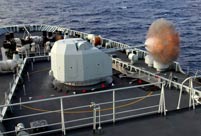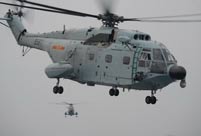 Turnip sculptures amaze tourists in Qingdao
Turnip sculptures amaze tourists in Qingdao Chinese ship formation conducts live fire training in West Pacific
Chinese ship formation conducts live fire training in West Pacific
 China comes in third at figure skating team event
China comes in third at figure skating team event
 China's teenager skater Yan shines at his Olympic debut
China's teenager skater Yan shines at his Olympic debut
 Taiwan-born actor stars on US TV series
Taiwan-born actor stars on US TV series
 Chinese Lunar New Year gift from abroad
Chinese Lunar New Year gift from abroad Chinese champions of Winter Olympic Games
Chinese champions of Winter Olympic Games  Zhang Yimou fined 7.48 mln for over-production
Zhang Yimou fined 7.48 mln for over-production
 Top 10 timeless female Chinese stars
Top 10 timeless female Chinese stars
SINGAPORE, Feb. 13 -- Some of the industry players from China are already marketing utility aircraft for pilot training at the ongoing Singapore Airshow, even as experts say the reforms in low altitude airspace management are still "relatively slower" than what the members of the public want.
A Chinese company that operates a private-run aviation industry park from the eastern province of Jiangsu on Thursday presented the AT-3 two-seat utility aircraft manufactured by Poland-based Aero AT, which has been acquired by the Chinese company.
The Aero AT-3 is a two-seat utility aircraft typically used for pilot training purposes.
The Chinese company is also building a plant in China to capture opportunities it sees in the general aviation sector.
"We expect many people training to get pilot licenses in China if the low altitude airspace restrictions are removed. The pilots flying commercial aircraft would have to start training with small planes, too," said Steven Zhang, director of the company.
China has announced reforms in recent years to loosen airspace control. The airlines nowadays mostly do not have to seek approval from the military before they take off. The reforms are expected to unleash demand in the general aviation sector -- mostly smaller, private aircraft flying in low altitude airspace.
Aero AT is also considering manufacturing slightly bigger aircraft for the Chinese market, said Walter Jankowski, chief executive officer of the Poland-based company.
Under new regulations announced late last year, general aviation flights, no longer have to apply for approvals in advance with certain exceptions such as entering or exiting China's territories, flying through restricted zones and conducting aerial photography or surveys of military facilities.
The relaxed regulations were issued by the General Staff Headquarters of the People's Liberation Army and the Civil Aviation Administration of China.
However, experts like Yang Guoqing, vice president of the Chinese Society of Aeronautics and Astronautics and former deputy administrator of the Civil Aviation Administration of China, said that the reforms in low altitude airspace management still cannot catch up with expectations.
"By slower than expectations, I mean they still can not catch up with the expectations of the public. I am not saying that there has been no progress," Yang said at a forum on the sidelines of the airshow Wednesday.
He said that authorities and other players involved have been trying their best to push through the reforms.

 Highlights of opening ceremony of Sochi 2014 Winter Olympic Games
Highlights of opening ceremony of Sochi 2014 Winter Olympic Games Highlights of Chinese New Year celebrations around the world
Highlights of Chinese New Year celebrations around the world  Chinese ship formation conducts live fire training in West Pacific
Chinese ship formation conducts live fire training in West Pacific Sanya bans skinny dipping in public beach
Sanya bans skinny dipping in public beach Top 20 most beautiful Chinese stars
Top 20 most beautiful Chinese stars  PLA navy conducts landing drills in South China Sea
PLA navy conducts landing drills in South China Sea  Snowscape in Chinese New Year
Snowscape in Chinese New Year Top 10 timeless female Chinese stars
Top 10 timeless female Chinese stars Top 10 Chinese films in 2013
Top 10 Chinese films in 2013 New Year greetings from Chinese nationals in Africa
New Year greetings from Chinese nationals in Africa Miss Chinese Int'l Pageant 2014 held in Hong Kong
Miss Chinese Int'l Pageant 2014 held in Hong Kong Severe coldness freezes large parts of China
Severe coldness freezes large parts of China  Beautiful moments of Sochi
Beautiful moments of Sochi  It's not just performing this year
It's not just performing this year Selfies of "Little colorful flag" girl unveiled
Selfies of "Little colorful flag" girl unveiled Day|Week|Month